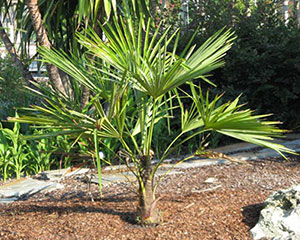Windmill Palm
Windmill palm’s compact shape makes it well suited for small yards or tight spaces like courtyards. The fruits and flowers do not present a litter problem making it a good choice for paved areas. Mature palms rarely grow above 25 feet high and their spread is only 6-10 feet. Windmill palms grow slowly, so small specimens will remain small for a number of years.
Windmill Palm
The Windmill Palm is a fast-growing palm that does well in cold weather making it a great palm for the Upstate of South Carolina (although it can thrive in the Lowcountry too).

Windmill Palm (Trachycarpus fortunei)
Other names: Chinese Windmill Palm, Chusan Palm
About the Windmill Palm:
The Windmill Palm Tree, also known as the Chinese Windmill Palm or the Chusan Palm, is the most cold hardy of the trunked palm tree varieties.
The tree has a thin trunk covered with hair like fibers. It u sually grows to about 25 feet in most areas but has been known to grow to 40 feet.
It is very fast growing for a palm and can stand temperatures down to 0° F.
The Windmill Palm is an attractive palm used as a specimen or in a grouping. It prefers adequate water in full sun. In some hotter climates would enjoy afternoon shade although it is not required. Thrives well in upstate South Carolina.
We recommend the Windmill Palm Tree for the both Upstate and Coastal regions of South Carolina
Caring for your Windmill Palm
We’ll be adding detailed information for taking care of your Windmill Palm. For now, though check out our general tips for palm tree care.
Ready to install your palm tree?
Fill out our 2-minute form and we’ll email you a customized quote
Windmill Palm

Windmill palm (Trachycarpus fortunei) in the Teaching Garden at the Gulf Coast Research and Education Center, Plant City campus.
In wintertime gardeners think a lot about what plants they’ll need to cover when cold weather strikes. One plant that doesn’t need protection is windmill palm.
Windmill palm (Trachycarpus fortunei) is not native to Florida but is considered Florida-Friendly. We love this palm because it is one of the most cold hardy available. It grows as far north as Canada and Scotland, but it’s also a versatile and attractive choice for North and Central Florida gardens.
Characteristics
Sometimes called Chusan palm, windmill palm is considered hardy in zones 8A–11, but it grows north of these regions as well and can handle temperatures as low as 10 degrees Fahrenheit.
Trachycarpus fortunei has fan-shaped fronds that are about 1.5 to 3 feet wide. The trunk is narrow, straight, slightly spiny, and looks like it’s been wrapped with burlap. In the summer and fall, clusters of yellow or white flowers appear. Small, blue fruits follow but do not attract wildlife.
Windmill palm’s compact shape makes it well suited for small yards or tight spaces like courtyards. The fruits and flowers do not present a litter problem making it a good choice for paved areas. Mature palms rarely grow above 25 feet high and their spread is only 6-10 feet. Windmill palms grow slowly, so small specimens will remain small for a number of years.
Planting and Care
This Florida-Friendly plant will grow best in partial shade and fertile soil. You can plant windmill palms in full sun but they may require irrigation during dry spells. Once established, they’re relatively drought tolerant. Windmill palms also do well in coastal neighborhoods, being moderately wind and salt tolerant as well.
Windmill palms are low maintenance. You can remove the dried fronds, but you certainly don’t need to. Occasional fertilizing can help prevent nutrient deficiencies. If you do fertilize, choose a slow release palm fertilizer (8-2-12).
Like many palms, Trachycarpus fortunei is vulnerable to root rot, lethal yellowing disease, and leaf spots. This palm is also susceptible to lethal bronzing disease, but the most common pests are scales and aphids.
For more information on palms in your landscape, please contact your county Extension office.